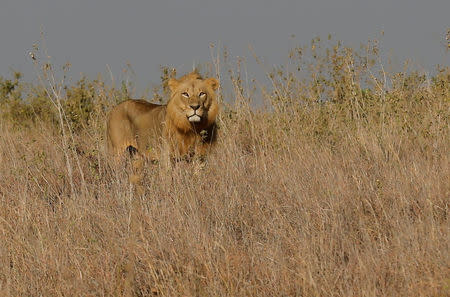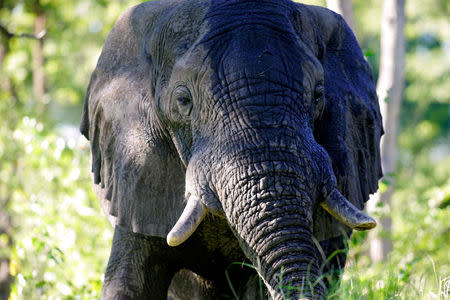Trophy-hunting foes sue to shut down Trump wildlife board
By Jonathan Stempel NEW YORK (Reuters) - Animal advocacy groups filed a lawsuit on Wednesday to shut down U.S. President Donald Trump's board advising on federal rules for importing big game, saying it is stacked with trophy hunters and politically connected donors and cannot serve the public interest. The lawsuit said the "deceptively named" International Wildlife Conservation Council actually promotes the hunting of and importing of body parts from "imperiled species" such as African elephants, lions and rhinos. It said the 17-member council, created last November by Interior Secretary Ryan Zinke, violates a 1972 federal law designed to curb White House use of "secretive" advisory panels to set national policy, and should lose its powers and charter. A spokeswoman for the Interior Department referred a request for comment to the U.S. Department of Justice, where a spokeswoman declined to comment. The lawsuit was filed in the U.S. District Court in Manhattan by the Natural Resources Defense Council, the Center for Biological Diversity and the Humane Society, all non-profit. They said the council caused harm by inhibiting their ability to publicly debate and contribute to federal wildlife policy. Zinke, a hunter and former Montana congressman, has said the council would advise on the benefits of international recreational hunting, and how American hunters "benefit international conservation from boosting economies and creating hundreds of jobs to enhancing wildlife conservation." The council's mission included providing advice on removing import barriers for legally hunted wildlife, streamlining the permitting process and lifting unneeded import bans, as well as combating illegal trafficking and poaching. According to federal records, council members include Paul Babaz, president of Safari Club International; Erica Rhoad, director of hunting policy at the National Rifle Association; and Steven Chancellor, a Republican fundraiser. ((https://www.facadatabase.gov/committee/members.aspx?cid=2636)) The White House has sent mixed signals on the importing of big game. On March 1, the U.S. Fish and Wildlife Service reversed an Obama-era ban to allow the importing of trophies such as elephant tusks and lion hides, extending prior administration approval for imports of elephant parts from Zambia and Zimbabwe. ((https://www.fws.gov/international/pdf/memo-withdrawal-of-certain-findings-ESA-listed-species-sport-hunted-trophies.pdf)) But it also conflicted with a Nov. 19, 2017 tweet, after the Zambia and Zimbabwe approval, in which Trump said he would be "very hard pressed to change my mind that this horror show in any way helps conservation of Elephants or any other animal." Trump's adult sons are also trophy hunters. The case is Natural Resources Defense Council et al v Zinke et al, U.S. District Court, Southern District of New York, No. 18-06903. (Reporting by Jonathan Stempel in New York; Editing by Richard Chang and David Gregorio)


